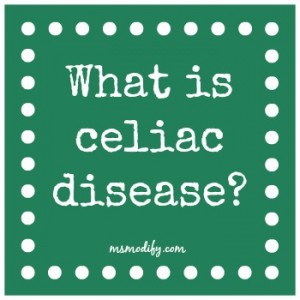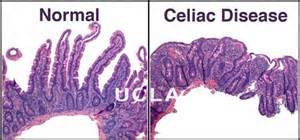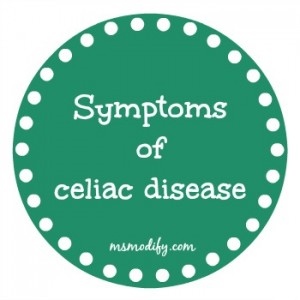 (*I am not a medical professional, so please consult your doctor with symptoms, concerns, etc.)
(*I am not a medical professional, so please consult your doctor with symptoms, concerns, etc.)
I get asked that question a lot. First off, it is NOT an allergy. People with celiac disease are not allergic to gluten.
I’ll be honest, when I go out to eat I often tell the server “I’m severely allergic to gluten” because the word “allergic” tends to scare them and the word “severely” really makes them take me serious. I’ve learned “celiac” doesn’t mean much to most servers.
Celiac disease is an autoimmune disorder affecting the small intestine. Gluten triggers the body to have an autoimmune reaction.
What is gluten?
That word seems to be oh so trendy right now, right?! Side note: I had a friend tell me she was on a gluten free diet and I asked her what gluten was and she said “bread” Ahhh… NO people!
Gluten is the protein found in wheat, rye, and barley (some people can’t tolerate oats).
What happens to your body if you have celiac disease and consume gluten?
Gluten causes an immune reaction (attacks and damages) to your body, which causes inflammation to the intestine and shortening of the intestinal villi. Nutrients are absorbed through the villi, so when your body is having an autoimmune reaction to gluten, the villi shrink together and your body cannot properly absorbs nutrients.
That’s why people with celiac disease often have poor absorption and vitamin deficiencies. I think of the villi as fingers which are normally open but when your body is having an autoimmune reaction the fingers tighten together into a fist; not allowing nutrients to pass through.
What is the prevalence of celiac disease?
Celiac affects 1 in 133 people in the US and more than 95% of people with celiac are still undiagnosed!
You can have gluten intolerance without having celiac disease. Meaning your body does not tolerate gluten and you feel sick, but you do not have the autoimmune disease (celiac).
There are over 300 symptoms! Wow!! What I feel, you may not ever experience and vice versa. I think this is the reason why people suffer so long before getting diagnosed… because there are no clear cut symptoms.
Some of the most common symptoms include:
• Digestive Problems (diarrhea, constipation, bloating, acid reflex, IBS, etc)
• Migraines/Chronic Headaches
• Chronic Fatigue
• Brain Fog
• Anemia/Vitamin Deficiencies
• Eczema / Skin Rashes/Itchy, Blistery Skin
• Depression/Anxiety
• Joint Pain/Muscle Pain/Numbness in fingers and hands
• Osteoporosis
• Infertility
*Symptoms in children can be different.
How to get tested?
Blood test and endoscopy.
**Do not start a gluten free diet until you have been tested. Once you are gluten free it can cause the tests to come back normal, when in fact you have the disease! If you are already gluten free, you can do genetic testing to see if you are a carrier for the celiac genes. If you are a carrier that means you could have or develop the disease at any time but does not necessarily mean you have it. If you do not have the genes, then you do not need to worry about having or getting celiac disease.
What is the treatment?
The only treatment for celiac disease is a lifelong strict gluten free diet. The risk of nutritional deficiencies, other autoimmune diseases, and cancer make it crucial to be on a strict gluten free diet as well as ongoing monitoring by a doctor.
Resources I recommend:
Like I said before, I’m not a doctor or an expert on celiac disease… but I did suffer a long time without knowing what was wrong and doctors’ telling me it was in my head. I have learned to understand my body and listen to it when things are not feeling right. I hope we can go through this journey together! I would love to hear your stories and experiences!
Happy gluten free eating friends! 🙂




